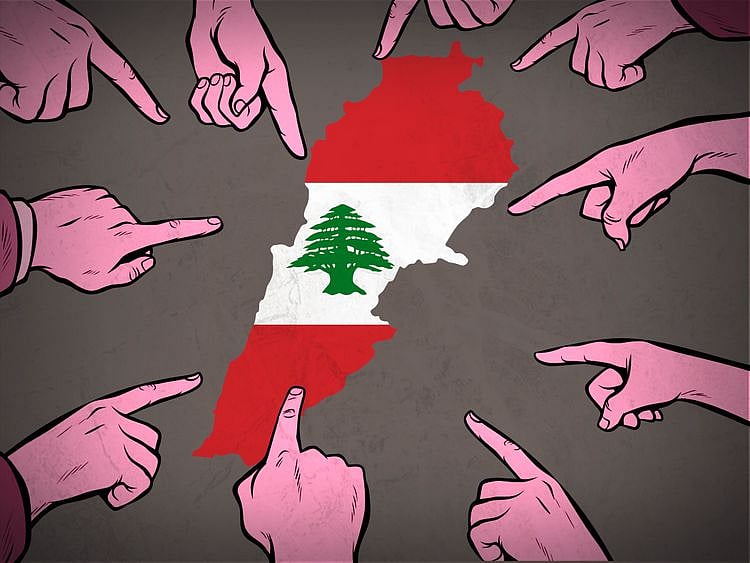What is Lebanon today? Put in a blender a self-serving ruling elite, along with a helpless people down on their luck and a prostrate nation withering on the vine, mix well, and you’ll have made yourself a modern-day Lebanon — a polity in free fall inexorably descending into political, economic and institutional collapse, ruled by freewheeling factions, topped by the likes of Hezbollah, whose loyalties are more in thrall to a foreign power than tied to their own country’s national interest.
This unconscionable fate that has befallen Lebanon is of great concern to the entire Arab world, given the fact that what happens in one country does not stay in that country, much in the manner that, as the saying has it, what happens in Las Vegas stays in Las Vegas.
Rather, the travails of one Arab country almost always have ripple effects, becoming part of the pan-Arab public debate and at times creating diplomatic strains and geopolitical shifts in the entire region.
Last Friday, Saudi Arabia gave the Lebanese ambassador 48 hours to leave the country.
The foreign ministry in Riyadh cited the reason as being comments by Lebanon’s Information Minister George Kordahi. The remark touches on cumulative acts of malfeasance by the various sectarian factions that make up the ruling class in Lebanon, acts that go all the way from calculatedly blocking reform to openly engaging in drug trafficking.
These factions in today’s Lebanon are running amuck, imbued with the feeling that they are untouchable, outside the reach of the laws of the land.
Consider this. You and I, along with everybody and his uncle, know what happened in Beirut on Aug. 4, 2020, when around 2750 tons of ammonium nitrate, mindlessly stored at the city’s port since 2014, within a block or two of densely populated neighbourhoods, exploded into an inferno that killed 225 people, injured 225, left hundreds of thousands homeless and around 86,000 homes destroyed.
Apocalypse allowed to happen
Well, you would imagine that a probe into how that apocalypse was allowed to happen — a probe owed the Lebanese people by their government — would’ve long been concluded by now. It is not. And it is not because these same factions have blocked it lest their complicity in the tragedy be exposed. As simple as that, my dear Watson.
On Saturday, in a lengthy article about how corruption has ruined Lebanon, the New York Times Beirut correspondent, Rania Abouzeid, wrote of what the prominent Lebanese investigative journalist Riad Kobassi saw while he looked into why no probe into the disaster was ever concluded and why no one person was ever indicted.
“Over the years”, wrote Abouzeid, “Kobassi and his colleagues have revealed how, for the right price, shipping containers [at the port] entered or exited the country without proper inspection. Containers were stolen and passed through security checkpoints. Of the 25 customs officials at the port responsible for inspecting containers, 16 were caught in footage taking bribes that Kobassi broadcast. All kept their jobs, even after eight were prosecuted and some were imprisoned. ‘Till now, till now, they are still serving in their positions at the Beirut harbour. Till now! You’re asking me how there was an explosion at the port? This is how’.”
A basket case
It was, incidentally, in these very containers, marked as agricultural products, that Lebanese drug kingpins, operating in cahoots with these factions — political blocks, like Hezbollah, smuggled tens of millions of emphetamine pills into Saudi Arabia that the authorities discovered last year. (In April, Riyadh in a predictable retaliatory move, the kingdom banned any further Lebanese agricultural products from entering the kingdom.)
Ironically, it was Saudi Arabia, along with the other Gulf states, that was key in efforts to fund the rebuilding of Lebanon, in particular its national capital, in the wake of the crushing 15-year civil war that ended in 1990, and that went on to become the country’s largest export market. Billions of dollars were invested in the nation’s economy and its infrastructure. Yet today, more than three decades after the fact, Lebanon is a basket case, with its currency virtually worthless and its people pitiably destitute.
So is there a heavy-duty crisis, or a crisis of any kind, between Lebanon and the Gulf states?
Asked about that by CNBC last Saturday while he was in Rome, Saudi Arabia’s Foreign Minister, Prince Faisal Bin Farhan, said: “I don’t think I would call it a crisis. I think we simply have come to the conclusion that dealing with Lebanon and its current government is not productive ... with Hezbollah’s continuing dominance of the political scene, and with what we perceive as a continuing reluctance by the government and Lebanon’s political leaders to enact the necessary reforms ... in order to push the country in the direction of real change. We have decided that engagement at this point is not productive or useful, and it’s not really in our interests”.
We can also look at it this way: when an ambassador to your country has nothing credible left to say about the incredible political system in the nation he represents, it is time for that ambassador to be told that he should lift anchor and sail away.
— Fawaz Turki is a journalist, academic and author based in Washington. He is the author of The Disinherited: Journal of a Palestinian Exile
Sign up for the Daily Briefing
Get the latest news and updates straight to your inbox
Network Links
GN StoreDownload our app
© Al Nisr Publishing LLC 2025. All rights reserved.
